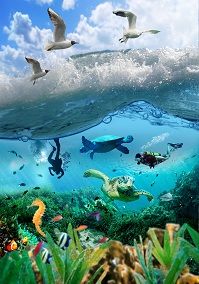Better analysis for healthier marine ecosystems

Related topics
Environment & climate action Aquatic Resources Innovation Denmark France Germany Greece Italy Lithuania Netherlands Spain United Kingdom Environment Food security, sustainable agriculture and forestry, maritime and martime inland water research and bio-economy Norway South Africa Turkeydate: 03/03/2014
Project: Marine ecosystem evolution in a changing...
acronym: MEECE
See also: CORDIS
Contact: www.pml.ac.uk
“Making measurements in the marine environment is difficult and expensive. There are not that many things that you can measure in large quantities,” says project coordinator Prof Icarus Allen of the Plymouth Marine Laboratory. “We proposed a modelling approach that allows us to switch between the measurements. We can numerically ‘perturb’ the system to see how it might respond,” he adds.
Such models are useful for both scientists and decision makers. “We wanted to explore the models to see how they can help us understand the current state of the system and what causes it to be like it is – and how the system may evolve in the future,” comments Prof Allen.
Establishing the links between degraded marine ecosystems and human activities could enable decision makers and marine managers to take effective conservation action.
The MEECE team used model simulations to develop management strategies that address combinations of climate, pollution, invasive species and fishing impacts.
Marine conditions are complex and vary from region to region. Enclosed basins, such as the Adriatic, the Black Sea and the Baltic Sea, are highly responsive to the effects of wind, while the ecosystems of shallow seas connected to the open ocean, such as the Bay of Biscay (a gulf of the northeast Atlantic Ocean), are sensitive to changes in the nutrient supply from the open ocean.
One of the main outcomes of the project was an online atlas that shows the picture at a local level. “The MEECE Atlas gives a window into the potential impact of climate change on marine ecosystems. Essentially, what we have done is to bring together a wide range of information from across Europe and have tried to link, on a regional basis, information about the potential impacts and different perturbations on the system,” explains Prof Allen.
While the project led directly to the development of some analytical tools, such as a “specific decision-making tool”, its project partners have subsequently further developed this aspect of the project. “Some of our partners were organisations that are more directly involved in national activities – i.e. the implementation of the MSFD and the common fisheries policy. Some of the tools that have been developed by them – such as the decision-support tools around fisheries, for example, in the Bay of Biscay – are now being used as part of scientific assessments,” adds Prof Allen.
A follow-up project to MEECE is expected to further advance the achievements of its predecessor, particularly in the area of policy. “Taking the model systems from MEECE and other projects and then putting them into an operational framework – running near real-time simulations of the marine ecosystems around Europe – will provide marine information that could help inform policymakers,” concludes Prof Allen.
